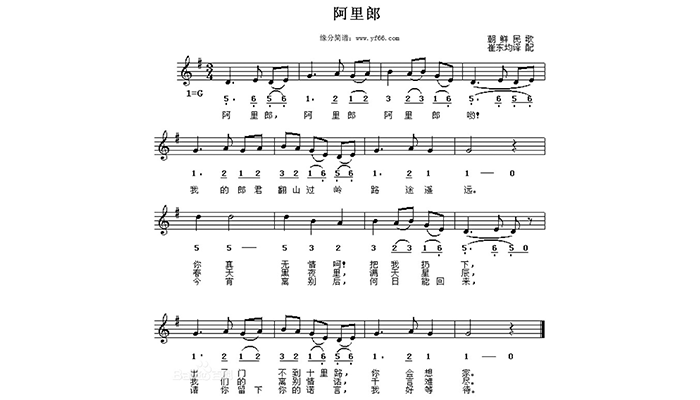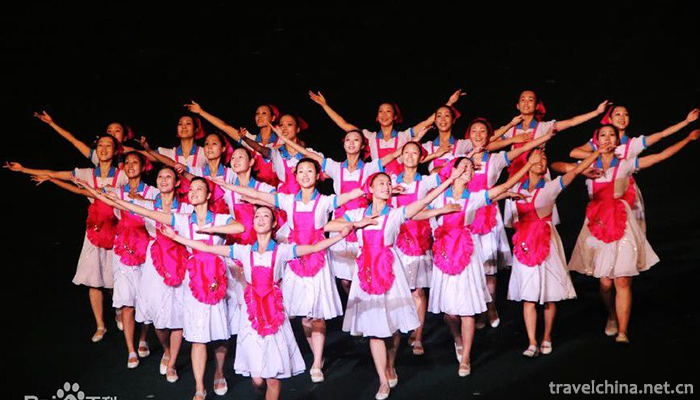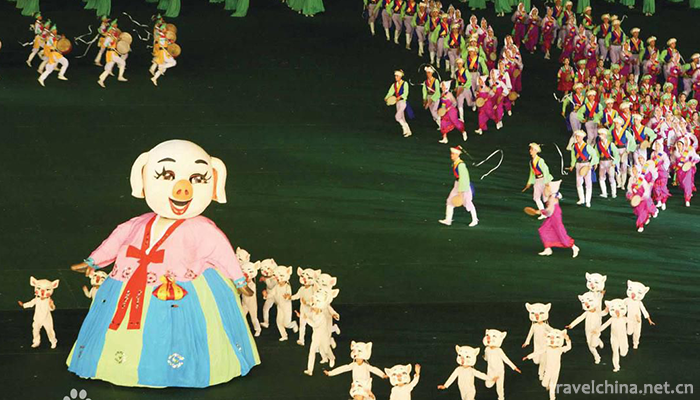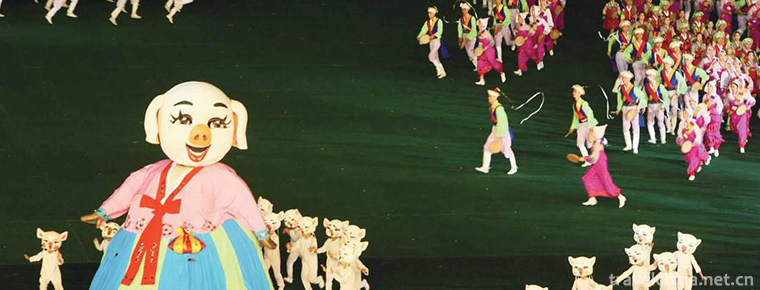Arirang
Arirang
Alirang, known as Alirang Daling, is a famous Korean song and the most representative folk song on the Korean Peninsula. It is known as the "First National Anthem" and "National Songs" of the Korean nation. It has different versions in different places, and the most common one is "Arirang in this tune", which is popular in the area of Gyeonggi Dao, Korea. This version is popular because it became the theme song of the 1926 film of the same name. It was later used as a live music for delegations of the Republic of Korea and the Democratic People's Republic of Korea during the 2000 Sydney Olympics.
In June 2011, Alirang was included in the national intangible cultural heritage list of the People's Republic of China.
At the seventh meeting of the Intergovernmental Committee for the Protection of Intangible Cultural Heritage, held in Paris on 5 December 2012, UNESCO decided to include Arirang in the list of intangible cultural heritage of mankind.
Background of songs
Song story
Arirang is a love story handed down from the Koryo period.
Perhaps the plot is a loving young couple, living a hard life, the husband wants his wife to live a good life, want to go out to work to earn money, but the wife refused to let, said that as long as they stay together she would be satisfied, but the husband did not think so, one night quietly left. The wife is very beautiful, and all the villages are famous. After her husband left, the ruffians in the village harassed her and asked her to remarry. She refused, but the ruffians always harassed her. A year later, the husband came back from earning money. The husband and wife were happy. The ruffians came again. There was also gossip about wives and ruffians in the village. The husband became suspicious and thought that his wife was not faithful and would leave again. The wife could not explain it. The husband left. The wife chased after him and sang when she couldn't catch up with him. The content of the song is probably about how the husband cares about, misses, wrongs and so on. My wife sang this passage is "My Langjun", that is, Arirang, and finally her sincerity melted the husband's cold heart, the couple love as before, they left their hometown to live a happy life in the capital. Later, the story and song of Ali Lang spread and became a representative classic music card of the Korean nation. No matter where in the world, as long as there are Korean people, Ali Lang will be known as the Korean nationality by singing Ali Lang.
During the period of Japanese rule, the Koreans launched an uprising under the name of Alirang. The Japanese found out that whoever sang Alirang would kill him. But killing ten people to sing, killing ten hundred people to sing, killing a hundred thousand people to sing again, the more they sing, the Japanese have to stop.
Textual research
The origin of Alirang Opera is said to be Yan Ying, the wife of Pak He, the ancestor of New Luo, who lived in the world and was renamed "Alirang". It was created by the native Qude. Or the Alirang tune, which is imitated after playing the Korean flute for a long time. Among them, the legend of Mercy Hill is more trustworthy.
The Mercy Ridge (now known as Qiling, in Huanghai Hokkaido, Huangzhou, Korea Peninsula) exists on the map of the Korean Peninsula today. When Emperor Wudi of Han Dynasty set up four counties on the Korean Peninsula, the northern nationalities of the mainland began to migrate across the river because of oppression. These emigrants who have left their homeland are lamenting in Ciling, Guanzhi, North Passage. Many old and weak women and children are dying of illness. In this exile, Ali Lang Qu spread to the middle of the Korean Peninsula, expressing the pain of immigrants'hearts, after climbing mountains and crossing mountains, Ali Lang Qu was spread to the middle of the Korean Peninsula. Historians believe that these foreign nationalities regarded by the Han people as Dongyi are ancient Korean nationalities, and Arirang is the onomatopoeia of the Korean ancient language "Lelang".
There is also a widely circulated saying that "Alirang" means "I am deaf". In the 19th century, the emperor of Xingxuan Grand Court was in power, and civil engineering was greatly promoted to rebuild Jingfu Palace. In order to rebuild this luxurious palace, the Court seized and plundered from the people, imposed heavy taxes such as "willing to pay money" and forced corvee, so that the whole Korean people were not bored. People say angrily, "It's better to be deaf than deaf. It's quiet to be deaf!" Thus, the civilian husband who was dragged to serve compiled the ballad "My Deafness", expressing the sadness in his heart, and later evolved into "Alirang". It is also said that the background is the reign of the monarch of the courtyard and the restoration of Jingfu Palace, but the difference is that Arirang originated from "I left my mother", which is the ballad of the people who were dragged to rebuild Jingfu Palace missing their mother.
There are many versions of Arirang, whose lyrics vary slightly according to different places in the Korean Peninsula. But in Korean, Arirang is not a person's name, but a place name. Some people think it's a mountain's name, but they can't prove where it is. Alilangqu in different places, though not the same, shows the perseverance and perseverance of ancient women.
Song appreciation
This "Arirang" narrates a Korean girl's yearning for her husband and her desire for love. The melody is euphemistic and lyrical, and the rhythm is light and smooth. The whole song is composed of two phrases, the upper and the lower, and repeats with changes. It is composed of double sentences with a chorus. "Arirang" is a 3/4 beat, sub-tone palace-style melody. Mood slightly sad, is a representative Korean folk song.
The folk song "Arirang" is divided into two parts, the melody of which often takes the form of surround but little big jump, and is a common progressive way, reflecting the repetition and reproduction of rhythm, showing the dignity, elegance and delicacy of Korean folk songs. But Korean folk songs are full of passion. That is the five-degree upward jump and rhythmic transformation between the eight and nine sub-sections, forming the climax of the whole song. After two bars, it goes down continuously until the lowest tone of the whole tune, and the first part of the first part of the tune appears. Make music calm and implicit after an exciting and brief catharsis. This is a folk song (a, a1) in which two big phrases change and repeat.
Pass through
Arirang is a popular song on the Korean Peninsula. It was gradually popular in the late Korean Dynasty, but it was generally defined as "gorgeous song" or "barren sound" by the society, and its status is not very high, especially for Confucian scholar-bureaucrats. Historically, Gaozong of Korea liked to listen to Alirang very much, playing it to him every night in the palace. There are more than 30 versions of Alirang on the Korean Peninsula. In addition to Peishan Alirang, Yongchuan Alirang, Miyang Alirang, Zhendao Alirang, Gaocheng Alirang, Jiangnan Alirang, Duanchuan Alirang, Ping'an Alirang and so on, among which Peishan Alirang is the most popular. For its fame, it ranks second only to Alirang in this tune. In the period of Japanese colonial rule (1910-1945), especially after the film "Alirang" produced by Luo Yunkui came out in 1926, Alirang began to be valued as a Korean folk song and gradually finalized. So far, Arirang bears the national consciousness of the Korean nation and is praised as the "first national anthem" and "national song" of the Korean nation.
In modern times, "Arirang" began to be displayed on the international stage as a brand image of the Korean nation. The Democratic People's Republic of Korea (DPRK/DPRK) holds the "Arirang Festival" every year to show the national image of DPRK (DPRK/DPRK) through the large-scale artistic performance "Arirang".
Song influence
At the 2000 Sydney Olympic Games, Arirang became the entrance music for the delegations of the Democratic People's Republic of Korea and the Republic of Korea to enter the stadium together.
In June 2011, the State Council of the People's Republic of China designated Alirang as the national intangible cultural heritage.
On December 5, 2012, UNESCO included the Korean traditional ballad Arirang in the list of intangible cultural heritage of mankind.
On July 14, 2015, the Korea Cultural Finance Department said that in order to designate the ballad "Arirang" as an important intangible cultural heritage, the Department began to seek advice from the community.
On February 9, 2018, the Korean and Korean delegations of the 23rd Pyongchang Winter Olympic Games jointly entered the venue, where the Korean folk song "Arirang" was sounded.




-
1.Guyuan Northern Dynasty Sui and Tang Dynasties Cemetery
The tombs of the Northern Dynasty and Sui and Tang Dynasties in Guyuan are located in Xiaomazhuang, Yangfang, Shengou, Dabao, Wanglioba, five natural villages in the West and south suburbs of Yuanzhou
Time 2019-01-12 -
2.Shangqiu Ancient Culture Tourist Area
Shangqiu Ancient Culture Tourist Area is located in Suiyang District of Shangqiu City. Based on Shangqiu Ancient City, the area of 12.6 square kilometers is covered by Guidefu City
Time 2019-02-08 -
3.Abakh Hoja Tomb
Xiangfei Tomb is located in Haohan Village, 5 km east suburb of Kashgar City. It is a key cultural relic protection unit in the autonomous region. This is a typical Islamic complex of ancient building
Time 2019-02-25 -
4.Folk Stories in Guangyang Town
"Guangyang Folk Stories" is the general name of folklores and stories widely spread in Guangyang Town. Guangyang folk tales are popular in the local area.
Time 2019-05-01 -
5.Legend of bald tailed Lao Li
Folk legends of bald-tailed Lao Li are widely circulated in Shandong Province, and similar written records are found in Yuan Mei's Zi Yu of the Qing Dynasty: "Bi Shifu, Wendeng County, Shandong P
Time 2019-06-23 -
6.Wutaishan Buddhist Music
Wutai Mountain Buddhist music refers to the traditional Buddhist music that has been circulating for a long time in the temples of Wutai Mountain, the top four famous mountains of Chinese Buddhism. Wu
Time 2019-06-29 -
7.Chord cavity
Based on Pingli dialect in Ankang City, Shaanxi Province, there are 13 singing patterns, including 8 commonly used tunes, 18 suona tunes and 30 gongs and drums. Pingli string is a complete set of loca
Time 2019-07-03 -
8.Xie Rong Zhongzi
Xierong Zhongzi still keeps the primitive and simple legacy, from which we can see the spiritual sustenance and aesthetic pursuit of Tibetan ancestors. This kind of primitive culture and art has becom
Time 2019-07-06 -
9.Chinese Fashion Making Skills
Chinese style clothing (dragon and Phoenix cheongsam) originated from the late Qing and Qianlong dynasties, and is the inheritor of the Shanghai style cheongsam. Hengsheng's suit, which originated in
Time 2019-08-03 -
10.Yinghua mountain
Yinghua mountain is located 37 kilometers northwest of Shifang City, Deyang City, Sichuan Province, 98 kilometers away from Chengdu. In 1986, it was designated as the first batch of provincial-level scenic spots, with a landscape area of 106 square kilometers.
Time 2020-11-05 -
11.Suining tertiary industry
In 2019, Suining achieved a total retail sales of consumer goods of 63.191 billion yuan, an increase of 10.7% over the previous year. In terms of business location, retail sales in urban areas reached 46.171 billion yuan, an increase of 10.7%; in rural areas
Time 2020-12-16 -
12.Leshan economy
In 2019, Leshan's GDP will reach 186.331 billion yuan, an increase of 7.6% over the previous year in terms of comparable prices. The industrial value increased by 24.288 billion yuan, with an increase of 24.288 billion yuan in the first value, and the second
Time 2020-12-17